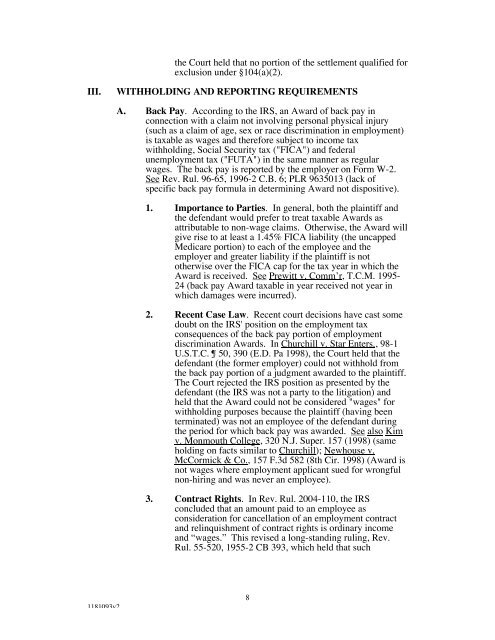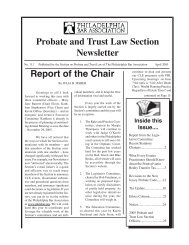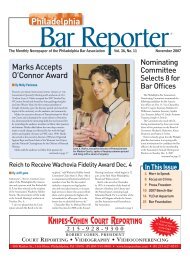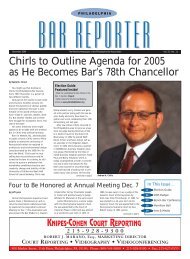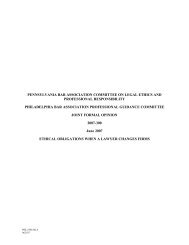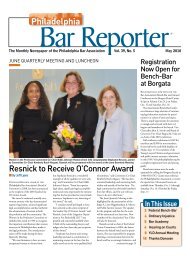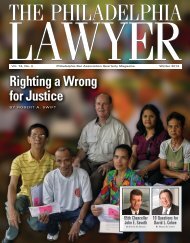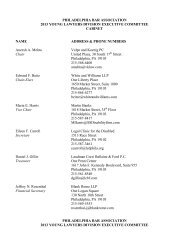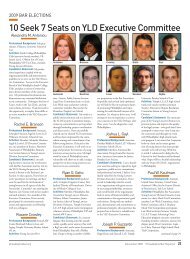Tax Aspects of Litigation Awards and Settlements - Philadelphia Bar ...
Tax Aspects of Litigation Awards and Settlements - Philadelphia Bar ...
Tax Aspects of Litigation Awards and Settlements - Philadelphia Bar ...
You also want an ePaper? Increase the reach of your titles
YUMPU automatically turns print PDFs into web optimized ePapers that Google loves.
the Court held that no portion <strong>of</strong> the settlement qualified for<br />
exclusion under §104(a)(2).<br />
III.<br />
WITHHOLDING AND REPORTING REQUIREMENTS<br />
A. Back Pay. According to the IRS, an Award <strong>of</strong> back pay in<br />
connection with a claim not involving personal physical injury<br />
(such as a claim <strong>of</strong> age, sex or race discrimination in employment)<br />
is taxable as wages <strong>and</strong> therefore subject to income tax<br />
withholding, Social Security tax ("FICA") <strong>and</strong> federal<br />
unemployment tax ("FUTA") in the same manner as regular<br />
wages. The back pay is reported by the employer on Form W-2.<br />
See Rev. Rul. 96-65, 1996-2 C.B. 6; PLR 9635013 (lack <strong>of</strong><br />
specific back pay formula in determining Award not dispositive).<br />
1. Importance to Parties. In general, both the plaintiff <strong>and</strong><br />
the defendant would prefer to treat taxable <strong>Awards</strong> as<br />
attributable to non-wage claims. Otherwise, the Award will<br />
give rise to at least a 1.45% FICA liability (the uncapped<br />
Medicare portion) to each <strong>of</strong> the employee <strong>and</strong> the<br />
employer <strong>and</strong> greater liability if the plaintiff is not<br />
otherwise over the FICA cap for the tax year in which the<br />
Award is received. See Prewitt v. Comm’r, T.C.M. 1995-<br />
24 (back pay Award taxable in year received not year in<br />
which damages were incurred).<br />
2. Recent Case Law. Recent court decisions have cast some<br />
doubt on the IRS' position on the employment tax<br />
consequences <strong>of</strong> the back pay portion <strong>of</strong> employment<br />
discrimination <strong>Awards</strong>. In Churchill v. Star Enters., 98-1<br />
U.S.T.C. 50, 390 (E.D. Pa 1998), the Court held that the<br />
defendant (the former employer) could not withhold from<br />
the back pay portion <strong>of</strong> a judgment awarded to the plaintiff.<br />
The Court rejected the IRS position as presented by the<br />
defendant (the IRS was not a party to the litigation) <strong>and</strong><br />
held that the Award could not be considered "wages" for<br />
withholding purposes because the plaintiff (having been<br />
terminated) was not an employee <strong>of</strong> the defendant during<br />
the period for which back pay was awarded. See also Kim<br />
v. Monmouth College, 320 N.J. Super. 157 (1998) (same<br />
holding on facts similar to Churchill); Newhouse v.<br />
McCormick & Co., 157 F.3d 582 (8th Cir. 1998) (Award is<br />
not wages where employment applicant sued for wrongful<br />
non-hiring <strong>and</strong> was never an employee).<br />
3. Contract Rights. In Rev. Rul. 2004-110, the IRS<br />
concluded that an amount paid to an employee as<br />
consideration for cancellation <strong>of</strong> an employment contract<br />
<strong>and</strong> relinquishment <strong>of</strong> contract rights is ordinary income<br />
<strong>and</strong> “wages.” This revised a long-st<strong>and</strong>ing ruling, Rev.<br />
Rul. 55-520, 1955-2 CB 393, which held that such<br />
1181093v2<br />
8


